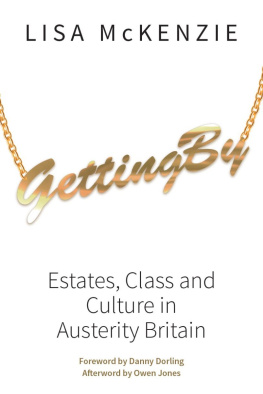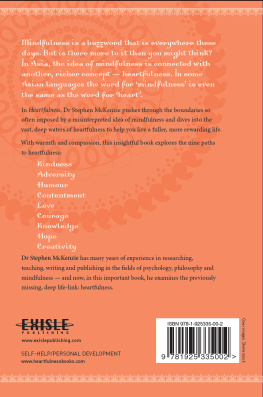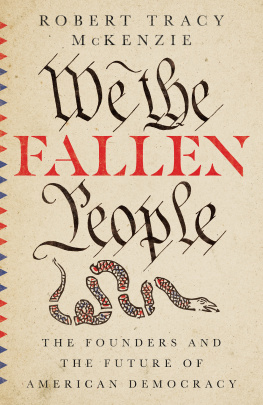GETTING BY
Estates, class and culture
in austerity Britain
Lisa Mckenzie

For Gwen Macleod
our mam,
and a great trade unionist and socialist
First published in Great Britain in 2015 by
Policy Press University of Bristol 1-9 Old Park Hill Bristol BS2 8BB UK Tel +44 (0)117 954 5940 e-mail
North American office: Policy Press c/o The University of Chicago Press 1427 East 60th Street Chicago, IL 60637, USA t: +1 773 702 7700 f: +1 773-702-9756 e:
Policy Press 2015
British Library Cataloguing in Publication Data
A catalogue record for this book is available from the British Library
Library of Congress Cataloging-in-Publication Data
A catalog record for this book has been requested
ISBN 978 1 44730 995 6 paperback
ISBN 978 1 44731 129 4 ePub
ISBN 978 1 44731 130 0 Kindle
The right of Lisa Mckenzie to be identified as author of this work has been asserted by her in accordance with the Copyright, Designs and Patents Act.1988
All rights reserved: no part of this publication may be reproduced, stored in a retrieval system, or transmitted in any form or by any means, electronic, mechanical, photocopying, recording, or otherwise without the prior permission of Policy Press.
The statements and opinions contained within this publication are solely those of the author and not of the University of Bristol or Policy Press. The University of Bristol and Policy Press disclaim responsibility for any injury to persons or property resulting from any material published in this publication.
Policy Press works to counter discrimination on grounds of gender, race, disability, age and sexuality.
Cover design by Soapbox, www.soapbox.co.uk
Readers Guide
This book has been optimised for PDA.
Tables may have been presented to accommodate this devices limitations.
Image presentation is limited by this devices limitations.
Contents
Acknowledgements
Low-income working class families have over the last two generations been increasingly positioned to rely on the state to ensure they have enough to survive. This is because of low wages, or no wages, the precarity of the financial markets and because of the inadequate and shameful state of social housing in the United Kingdom. These families, and communities deserve respect, dignity, pride and acknowledgment. Consequently I would like to acknowledge all of those in the UK who are finding themselves in this increasingly precarious position. I hope I am able to do you justice within this book, and I promise I will never give up the fight against inequality, and the lack of justice in our society for working-class people and communities.
Thank you to my family from the Carsic Estate in Sutton-in- Ashfield for instilling in me at a very young age a class pride and a determination to know that we are people of value, we are strong, and our communities are important to us above all else. These values are the greatest gift anyone could be given, and they are my inheritance from my long line of Derbyshire farmhands and Nottinghamshire miners. Margaret Thatcher, her boys and their ideology did not break these despite the war they waged on us in 1984. We did not lose those.
I need to thank the community in St Anns for adopting me as their own when I was a young 19-year-old mother and needed help. I have had the most happiness and a lot of sadness on this estate so thank you for your continued help and support over 25 years. I hope I have done your kindness, hardships, spirit and humour justice.
My colleagues in the academic world have supported me and believed in me when I really didnt believe in myself especially John Holmwood and Gurminder Bhambra, Bev Skeggs and, more recently, Mike Savage. Thank you, I hope I have proved worth it.
Alison Shaw at Policy Press who from the day she met me has supported this project and believed in it. This book would really not have happened without her. I am eternally grateful for her support.
To the late Ken Coates and to Bill Silburn all I can say to you is my admiration and respect for lives lived fighting inequality is endless. You are both giants and they truly dont make them like you anymore.
Lastly I could not have written this book without the support and love from my dad, Ian Macleod, who I cannot say how proud of him I am. One of only 15 miners who stayed out at SilverHill Pit in 1984.
And to my son, Leon, who is always the light in any dark time.
Note: Throughout my research all names have been changed, to offer anonymity to the individual residents who have spoken to me and become part of this narrative from St Anns.
About the author
Lisa Mckenzie left school officially in May 1984 when she was 16 years old. Unofficially she left in early March that year because of the disruption the police were causing when they invaded the small mining town in Nottinghamshire where she lived with her striking family. She worked at the Pretty Polly factory making tights until she was 25, then worked part time in shops in Nottingham city centre before working in housing projects and homeless hostels. She enrolled on an Access course in 2000, eventually completing her higher education at the University of Nottingham following an undergraduate degree, a masters degree and finally handing in her PhD in September 2009.
She has used her experience in and out of university to collect stories, and to interpret the narratives from people she cares passionately about because of the levels of injustice visited on them. She considers her research to be active and political sociology, and herself as an activist sociologist.
Foreword
The world is changing rapidly. A century ago almost all accounts of the lives of the poor were written by the rich and often for the rich. Occasional exceptions, such as The ragged trousered philanthropists (Tressell, 1914), proved the rule. Lisa Mckenzie begins her account of life in St Anns with her reaction to reading George Orwells observation that the poor smelt.
Fifty years ago social observation had become the territory of the concerned middle class and other only slightly less affluent outsiders. In this book Lisa talks more warmly of Ken Coates and Richard Silburns studies of St Anns, published as Poverty: The forgotten Englishmen by Penguin in 1970. But these were still outsiders perspectives, shocking the English middle class of the day by revealing that areas remained in England where not all children had shoes. Ken had been a Nottinghamshire miner, but only came to that because he refused to be conscripted into the army.
Today those who have been poor increasingly write their own stories of living in poverty. Lisas family were Derbyshire agricultural labourers and Nottinghamshire miners with few other employment opportunities. From leaving school around the age of 15 she worked at the Pretty Polly factory making tights until she was 25, then worked part time in shops in Nottingham city centre. She has been homeless, and afraid. She did too much too young. She had a mixed-race child and lived in St Anns as a young mother.
Lisa later spent many years at Nottingham University becoming a social scientist learning how to use long words, to anonymise the identities of her interviewees, to call people by their surnames when writing, to read obscure texts, to produce a PhD thesis and to get funding to study the estate she lived on but she didnt have to struggle to know what she was talking about. She only had to struggle to learn how to talk about it in the ways expected for a largely middle-class, academic readership.
Today we translate. We describe the different worlds we live in to each other as those worlds move apart. More and more people try to span these worlds. Observation is not longer enough; immersion is no longer enough. As the gaps between our experiences grow it becomes ever more necessary to hear largely first-hand, unadulterated accounts, the descriptions from the inside.
Next page











